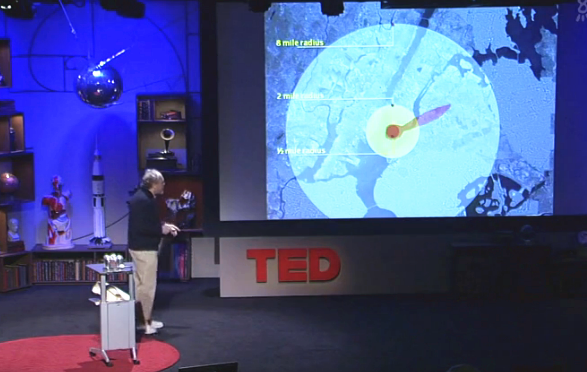And what happens is -- this is -- I'm going to show you now some fallout plumes.
接下來將要發生的-這是-我現在要向大家演示放射性墜塵。
Within 20 minutes, it comes straight down.
在20分鐘內,墜塵直線下落;
Within 24 hours, lethal radiation is going out with prevailing winds,
24小時內,致命的輻射將隨著盛行風飄散
and it's mostly in this particular direction -- it's going northeast.
基本上沿著某一特定方向向東北方飄去
And if you're in this vicinity, you've got to get away.
如果你在這附近,就得設法逃離
So you're feeling the wind -- and this tremendous wind now that you're going to be feeling --
如果你感覺到了風,感覺到這股強勁的風
and you want to go perpendicular to the wind or downwind,
你就應該沿著垂直與風向的方向逃走或者順著風的方向
if you are in fact able to see where the blast was in front of you.
如果你能看到爆炸發生的地方的話
You've got to get out of there.
你必須趕快離開那兒

If you don't get out of there, you're going to be exposed to lethal radiation in very short order.
如果你沒有迅速離開,你很快就會近距離暴露在致命的輻射中
If you can't get out of there, we want you to go into a shelter and stay there.
如果你無法離開那里,我希望你能找一個避難所躲起來
Now, in a shelter in an urban area means you have to be either in a basement as deep as possible,
躲在城市里的避難所指的是,要么躲在地下室,越深越好
or you have to be on a floor -- on a high floor --
要么躲在樓上,越高越好
if it's a ground burst explosion, which it would be, higher than the ninth floor.
如果是爆炸發生在地面上,輻射塵可能會到達9樓。
So you have to be tenth floor or higher, or in the basement.
所以你需要跑到10樓或者更高的樓層,或者躲到地下室
But basically, you've got to get out of town as quickly as possible.
但總的來說,你需要盡快離開這座城市,越快越好
And if you do that, you actually can survive a nuclear blast.
如果你這么做了,你其實是可以在一次核爆炸中生還的
Over the next few days to a week, there will be a radiation cloud,
在之后的幾天到一周內,如有輻射云
again, going with the wind, and settling down for another 15 or 20 miles out
同樣隨著風,然后下落,繼續往前推進15到20英里
in this case, over Long Island.
在這個例子中會飄過長島
And if you're in the direct fallout zone here,
如果你處于放射性墜塵經過的區域
you really have to either be sheltered or you have to get out of there,
你真的需要躲進避難所或者盡快離開
and that's clear. But if you are sheltered, you can actually survive.
這很明顯。但那是如果你能躲進避難所,你確實可以生還
The difference between knowing information of what you're going to do personally,
每個人是否知道應該如何逃生
and not knowing information, can save your life,
所帶來的區別
and it could mean the difference between 150,000 to 200,000 fatalities
影響了最終的死亡人數是15萬還是20萬
from something like this and half a million to 700,000 fatalities.
在這個例子中,將意味著死亡人數能否從70萬減少到50萬
So, response planning in the twenty-first century is both possible and is essential.
所以,21世紀的核應急預案不僅是可能的而且是必須的
But in 2008, there isn't one single American city
但是直到2008年,全美國沒有一個城市
that has done effective plans to deal with a nuclear detonation disaster.
擁有有效的應急預案來應對一次核爆炸災難
Part of the problem is that the emergency planners themselves,
部分原因是應急預案的制定者,
personally, are overwhelmed psychologically by the thought of nuclear catastrophe.
他們自己都已經被核災難這一想法從心理上擊潰了
They are paralyzed.
他們不知所措。
You say "nuclear" to them, and they're thinking,
你如果和他們說起“核”,他們會想,
"Oh my God, we're all gone. What's the point? It's futile."
“天啊,我們全都得死。還有什么可說的呢?這都是徒勞。”
And we're trying to tell them, "It's not futile.
我們所嘗試的就是告訴他們這其實并非徒勞:
We can change the survival rates by doing some commonsensical things."
我們可以通過做一些常識普及的工作來提高生還比例
So the goal here is to minimize fatalities.
我們的目標是將死亡人數降至最低
And I just want to leave you with the personal points that I think you might be interested in.
我希望留給大家一些個人的看法,我認為你們可能會感興趣的。
The key to surviving a nuclear blast is getting out, and not going into harm's way.
在核爆炸中生存的關鍵就是逃出去,并且不要誤入危險區域
That's basically all we're going to be talking about here.
這基本上就是我們接下來要討論的全部內容











